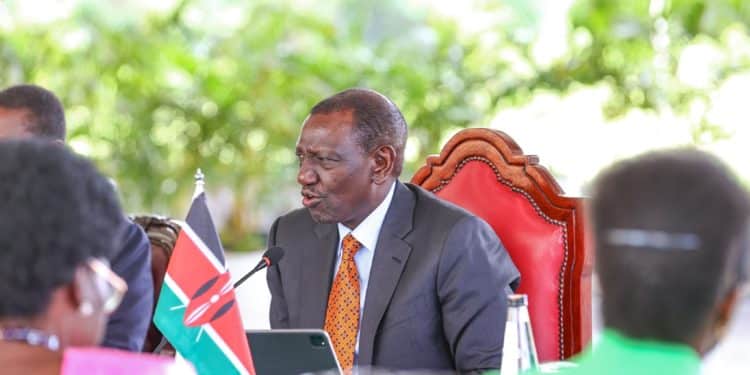President William Ruto has dissolved his cabinet, citing the need for a “broad-based government” to accelerate his administration’s agenda and address pressing economic challenges. The announcement came during a speech in which Ruto outlined his government’s achievements and acknowledged the high expectations of Kenyan citizens.
The move, which takes immediate effect, dismisses all cabinet secretaries and the attorney general, with the exception of the prime cabinet secretary and the cabinet secretary for foreign affairs and diaspora affairs. The office of the deputy president remains unaffected.
President Ruto, who came to power in September 2022 on a platform of economic reform and anti-corruption measures, framed the cabinet dissolution as a necessary step to expedite the implementation of his government’s programs. “I have today, in line with the powers given to me by the constitution, decided to dismiss with immediate effect all the cabinet secretaries and attorney general of the Republic of Kenya,” Ruto stated.
The president highlighted several achievements of his administration, including reducing inflation to 4.6%, stabilizing fuel prices, and preventing an “imminent debt default”. He also pointed to progress in education reform, social welfare programs, and the launch of the “Hustler Fund”, a micro-loan initiative that has reportedly benefited 2 million Kenyans.
However, Ruto acknowledged that recent events, including the withdrawal of the finance bill, have brought his administration to an “inflection point”. The president said, “Upon reflection, listening keenly to what the people of Kenya have said, and after a holistic appraisal of the performance of my cabinet, its achievements, and challenges, I have decided on this course of action.”
The dissolution comes at a critical time for Kenya’s economy, which has been grappling with high debt levels, inflation, and currency depreciation. Ruto emphasized the need for “radical measures” to address these issues, stating, “I will immediately engage in extensive consultations across different sectors and political formations and other Kenyans, both in public and private, with the aim of setting up a broad-based government.”
The president outlined several key objectives for the restructured government, including accelerating the implementation of existing programs, addressing the burden of debt, exploring ways to raise domestic resources and revenues, expanding job opportunities, eliminating wastage and unnecessary duplication of government agencies, and intensifying anti-corruption efforts.
“Consequently, [we will be] making the government of Kenya lean, inexpensive, effective, and efficient,” Ruto added.
The move has sent shockwaves through Kenya’s political landscape, with analysts speculating on the potential composition of the new cabinet and its implications for the country’s economic policies. Opposition leaders have yet to comment on the development.
Despite the cabinet dissolution, Ruto assured that government operations would continue uninterrupted under the guidance of principal secretaries and other relevant officials. He promised to announce additional measures and steps in due course.
The president also touched on other initiatives, including a universal health coverage plan set to launch on October 1, 2024, and efforts to boost domestic manufacturing. Ruto claimed that levies on imported clinker and steel billets had saved the country KES 40 billion in foreign exchange and led to the reopening of eleven steel factories, employing 16,000 Kenyans.
















